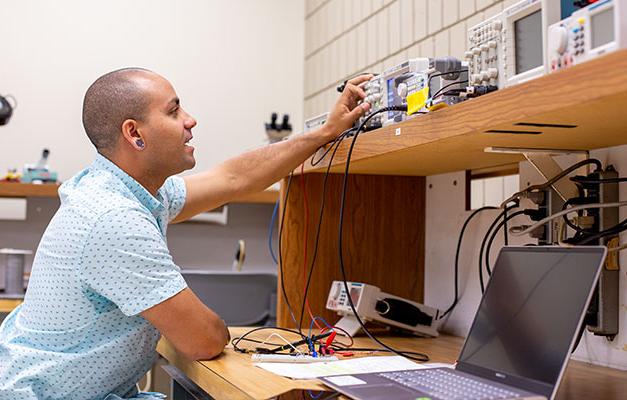Anoka Technical College's Electronic Technology diploma program provides students with the technical knowledge necessary to start their career in electronics and manufacturing support.
Students will obtain a solid education in electronic fundamentals, as well as system-level troubleshooting through the following skills:
- Mechatronics
- Lasers and optics
- Robotics
- Computer troubleshooting A+
- Networking
- Programmable Logic Controllers (PLCs)
- LabView programming applications

Affordable education with part-time options

Hands-on education taught by industry experts

Curriculum designed by industry partners
Potential Jobs:
- Electronics Technologist
- Electronics Technician
Salary Information:
Median Wage: $30.09 per hour
Information provided is for Minnesota. See current data at careerwise.minnstate.edu.
Program Details
The Anoka Technical College Electronic Engineering Technology (EET) program offers a 32-credit Electronic Technology (ET) diploma. The ET diploma provides students with the technical knowledge necessary to start a career in electronics.
Full-time students may complete an Electronic Technology diploma in two semesters. Full-time students who continue in the program can obtain an AAS degree in Electronic Engineering Technology (EET) with an additional two semesters. Students will obtain a solid education in electronic fundamentals, as well as system-level troubleshooting.
Students also learn about:
-
- Mechatronics
- Lasers and Optics
- Robotics
- Computer Troubleshooting A+
- Networking
- Programmable Logic Controllers (PLCs)
- LabView programming applications
Financial assistance is available for those who qualify and there are several EET program-specific scholarships available through the Anoka Techincal College Foundation.
- Interpersonal and employability skills: Communicate with peers and customers using professional, ethical and appropriate verbal and nonverbal communication skills; by accepting constructive feedback and displaying appropriate behavior; participating as a member of a team, exhibiting leadership and lifelong learning skills.
- Electronic Theory: Demonstrate a solid understanding of electronics; by interpreting electronic schematics and diagrams; research, organize and interpret information from various technical sources; identifying components; electronic test equipment used by technician in industry.
- Mechatronic Systems: Convey the understanding of complex relationships between sections of specialized equipment through written, verbal, and/or demonstrative methods.
- Troubleshooting: Demonstrate principles of troubleshooting and logical diagnosis by using critical thinking skills to define, analyze, and implement a solution.
- Mechatronic Applications: Evaluate and determine that all mechatronic equipment is in proper working condition, ensuring a safe, reliable manufacturing environment.
- Safety Compliance: Participate in class in a professional manner, by acting in compliance with documented safety procedures and appropriate industry standards.
As part of the Electronic Engineering Technology program, the Electronic Technology diploma provides students with the technical knowledge necessary to start their career in electronics and manufacturing support.
Wage information is available from the Minnesota Department of Education and the Minnesota Department of Employment and Economic Development.
Take a self-guided virtual tour of our campus to see what it's like to be a student at Anoka Tech. View program labs, common student spaces, campus offices and more.
Some courses in this program may require a prerequisite. Please see course descriptions for more details.
| Fall Semester | 16 | |
|---|---|---|
| ETEC 1102 | Mechatronics 1 DC | 3 |
| ETEC 1113 | Mechatronics 2 AC | 3 |
| ETEC 1141 | Circuit Analysis |
4
|
| ETEC 1151 | Computer Troubleshooting A+ |
3
|
| ETEC 1250 | Digital 1 | 3 |
| Spring Semester | 16 | |
| BMET 1301 | Biomedical Networking | 2 |
| ETEC 1170 | Programmable Logic Controllers (PLCs) | 2 |
| ETEC 1202 | Solid State Electronics Devices | 5 |
| ETEC 1260 | Lasers and Optics | 2 |
| ETEC 1271 | Technical Documentation | 3 |
| ETEC 1281 | Engineering Technology Programming: LabVIEW and C++ | 2 |
Students can choose to complete any of the electronics programs part-time. Part-time students will take longer to complete their program than students who follow the full-time sequence listed on the official program guides. Because every course may not be offered each semester, it is important for part-time students to reach out to their faculty advisor for help in planning their long-term, part-time course sequence.
Below, new students can find the first semester part-time course options. After the first semester, work with your faculty advisor to plan future semesters.
Course options may differ depending on whether you plan to start in the fall or spring semester. ETEC courses for new students are not always available in the spring term. A full-time student in any electronics program would take 16 credits their first semester. Part-time students must take a minimum of 10 credits.
Important: Students who place below college-level on the ACCUPLACER tests for Arithmetic and QAS (Quantitative Reasoning, Algebra & Stats) mathematics may benefit from starting with developmental math courses before any ETEC courses.
First Semester
ETEC 1102, ETEC 1113, ETEC 1141
- These 3 courses are corequisites and therefore must be taken together.
- In addition to developmental math courses, AAS degree students starting in the spring semester also have the option of starting with general education courses if no ETEC courses are being offered
Students must earn a cumulative 2.0 GPA or higher to be eligible for graduation from this program.
Biomedical Equipment Technician (BMET)
AAS degree
Robotic & Electronic Engineering Technology
AAS degree
Special Electronics Technician
AAS degree
Faculty
Enrollment Services
EnrollmentServices@expoconstruccionyucatan.com
763-576-7710
Current Students
Students must earn a cumulative 2.0 GPA or higher to be eligible for graduation from this program.
Start Dates:
Fall semester: August
Spring semester: January**
**Students who start in the spring will need more time to complete due to course prerequisites.
Upcoming Events:
Important Dates:
Tom Reid
TReid@expoconstruccionyucatan.com
Daniel Truchon
DTruchon@expoconstruccionyucatan.com
Enrollment Services
EnrollmentServices@expoconstruccionyucatan.com
763-576-7710







